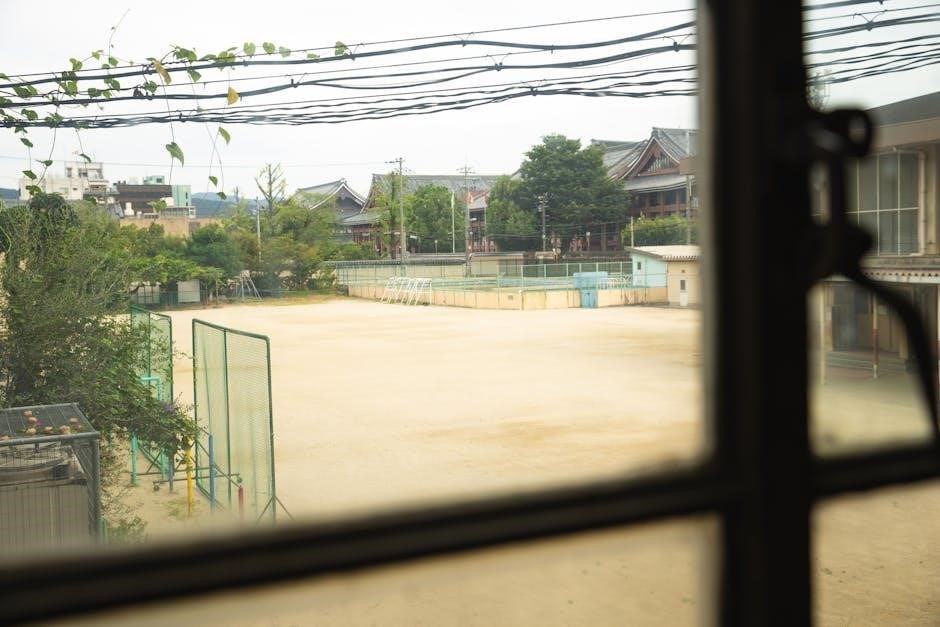fences by august wilson pdf
Fences, a Pulitzer Prize-winning play by August Wilson, explores the complex life of Troy Maxson, a Black man navigating racism, family dynamics, and personal identity in 1950s Pittsburgh. The play delves into themes of responsibility, betrayal, and the African American experience, set against the backdrop of a physical fence symbolizing emotional barriers. Wilson’s masterful storytelling weaves together dialogue and dialect, creating a powerful narrative that resonates deeply with its audience.
Overview of the Play
Fences by August Wilson is a compelling drama set in 1950s Pittsburgh, focusing on the Maxson family. The play centers around Troy Maxson, a former Negro League baseball player, as he struggles with racism, family responsibilities, and personal demons. Troy’s complex relationship with his wife, Rose, and his sons, Lyons and Cory, drives the narrative. The play unfolds in two acts, exploring themes of betrayal, identity, and the generational gap. A central symbol, the fence Troy builds, represents both physical and emotional barriers within the family. Through vivid dialogue and rich character development, Wilson examines the African American experience and the challenges of navigating a society fraught with inequality and unfulfilled dreams.
Historical Context of the 1950s Setting
The play is set in 1950s Pittsburgh, a period marked by racial segregation and limited opportunities for African Americans. The post-World War II economic boom largely excluded Black communities, perpetuating systemic racism. Troy Maxson’s experiences reflect this era’s barriers, as he faces discrimination in employment and housing. The Civil Rights Movement was gaining momentum, yet the legacy of Jim Crow laws and historical trauma lingered. Wilson uses this backdrop to explore themes of identity, inequality, and the struggle for dignity in a society resistant to change. The 1950s setting underscores Troy’s bitterness and his family’s resilience in the face of societal constraints.

Themes in “Fences”
Fences explores themes of race, family, betrayal, and redemption, delving into the complexities of the African American experience, father-son relationships, and the struggle for identity and forgiveness.
The African American Experience
August Wilson’s Fences profoundly explores the African American experience, highlighting systemic racism, economic struggles, and the emotional toll on Black families. Troy Maxson’s journey reflects the broader societal challenges faced by African Americans in the 1950s, including limited opportunities and racial discrimination. Through Troy’s pride in providing for his family and his internalized bitterness, Wilson illustrates the resilience and pain of Black men navigating a hostile world. The play also examines the intergenerational impact of racism, as Troy’s experiences shape his relationships with his sons, Lyons and Cory. Wilson’s portrayal offers a powerful commentary on identity, dignity, and the struggle for equality in a society fraught with inequality.
The Father-Son Relationship
The father-son relationship in Fences is marked by tension and unresolved conflicts, particularly between Troy and Cory. Troy, shaped by his own hardships and racial barriers, struggles to connect with Cory, whose ambitions and desires clash with Troy’s rigid expectations. Troy’s refusal to support Cory’s football career stems from his own bitter experiences, creating a deep rift. Cory, seeking validation and understanding, feels stifled by Troy’s authoritarianism. This dynamic reflects the broader theme of generational trauma and the challenges of fatherhood, as Troy’s inability to express love fosters resentment and misunderstanding. Their relationship underscores the complexities of familial bonds and unmet emotional needs.

Major Characters in “Fences”

Troy Maxson, a complex patriarch, Rose, his devoted wife, Cory, their conflicted son, and Gabriel, Troy’s mentally scarred brother, drive the emotional core of the play.
Troy Maxson: The Tragic Hero
Troy Maxson, the protagonist of Fences, is a complex, prideful man grappling with his role as a provider and father. His excessive pride stems from his difficult upbringing and racial oppression. Troy’s relationship with his son Cory is strained, as he struggles to understand Cory’s ambitions, fearing they will lead to disappointment. His decision to build a fence symbolizes his attempt to protect his family, yet it also creates emotional distance. Troy’s flaws and inability to change ultimately lead to his tragic downfall, making him a classic tragic hero. His story explores themes of responsibility, identity, and the cyclical nature of family conflicts.
Rose Maxson: The Voice of Reason
Rose Maxson, Troy’s wife, serves as the emotional anchor of the family, balancing Troy’s rigidness with her compassion and practicality. As a voice of reason, she mediates conflicts and keeps the family united. Despite Troy’s infidelity and emotional distance, Rose remains loyal, emphasizing the importance of family and responsibility. Her strength lies in her ability to navigate the challenges of her household while maintaining her dignity. Rose’s desire for a fence symbolizes her longing for unity and protection, contrasting with Troy’s internal barriers. Her character highlights the resilience of Black women in the face of societal and familial struggles, offering a nuanced portrayal of love and endurance.
Cory Maxson: The Struggling Son
Cory Maxson, the youngest son of Troy and Rose, embodies the generational struggle and tension within the Maxson family. His aspirations to play football and build a future independent of his father’s influence clash with Troy’s rigid expectations. Cory’s relationship with Troy is fraught with emotional distance and ideological conflict, as he seeks validation and understanding from a father who struggles to connect. Despite his efforts to carve out his own identity, Cory is deeply affected by Troy’s past traumas and the weight of unmet expectations. His journey reflects the challenges of navigating familial legacy while striving to forge his own path in life.
Gabriel Maxson: The Brother with a Mission
Gabriel Maxson, Troy’s brother, is a deeply troubled yet spiritually driven character in Fences. Suffering from mental health challenges, Gabriel believes he has a divine mission to guide people to the “promised land.” His presence adds a layer of mystical and emotional complexity to the story. Despite his struggles, Gabriel embodies a sense of innocence and hope, often serving as a moral compass for the Maxson family. His iconic trumpet symbolizes his quest to fulfill what he believes is his sacred duty. Gabriel’s interactions with Troy and Cory highlight the fractured dynamics within the family and underline themes of redemption and forgiveness that resonate throughout the play.

The Symbolism of the Fence
The fence in August Wilson’s Fences symbolizes both protection and division, reflecting the emotional barriers within the Maxson family and their complex relationships, while also embodying hope and reconciliation.
Physical and Emotional Barriers
The fence in August Wilson’s Fences serves as both a physical and emotional barrier, symbolizing the divisions within the Maxson family. Physically, it separates the family’s yard from the outside world, while emotionally, it represents the walls Troy has built around himself. Troy’s construction of the fence mirrors his efforts to protect his family, yet it also underscores his inability to connect with them deeply. The fence embodies the tension between protection and isolation, highlighting Troy’s complex relationship with his sons, Cory and Lyons, and his wife, Rose. It also reflects the broader societal barriers faced by African Americans in the 1950s, such as racism and economic limitations, which shape Troy’s worldview and behaviors. Through the fence, Wilson explores themes of separation, responsibility, and the struggle for unity in a fractured family and society.
The Fence as a Metaphor for Family Dynamics
The fence in August Wilson’s Fences serves as a powerful metaphor for the intricate dynamics within the Maxson family. It symbolizes both unity and division, representing Troy’s efforts to protect his family while also highlighting the emotional distances he creates. The fence embodies the tension between responsibility and estrangement, as Troy struggles to connect with his sons, Cory and Lyons, and his wife, Rose. Its construction mirrors the emotional barriers Troy erects to shield himself from vulnerability, reflecting his complex relationship with his family. The fence ultimately represents the fragile balance between protection and isolation, revealing the deeper struggles of identity and responsibility within the family.

August Wilson’s Writing Style
August Wilson’s writing style in Fences is characterized by rich dialogue and dialect, capturing the African American experience with authenticity and emotional depth, while his storytelling masterfully explores complex family dynamics and societal issues through vivid characters and poignant narratives; His use of language reflects the rhythm and cadence of everyday conversation, creating a sense of immediacy and connection with the audience.
The Use of Dialogue and Dialect
August Wilson’s masterful use of dialogue and dialect in Fences creates a vivid, authentic portrayal of African American life in the 1950s. The conversational tone reflects the rhythm and cadence of everyday speech, grounding the play in realism. Wilson’s characters speak with a richness and immediacy that captures their cultural identity and emotional depth. Troy’s robust, often confrontational dialogue, for instance, reveals his pride and internal struggles, while Rose’s voice carries a calm, steadfast wisdom. The dialect not only enhances the play’s authenticity but also serves as a tool for storytelling, allowing characters to express their histories, desires, and conflicts with profound clarity and resonance.
Wilson’s Dramaturgy and Storytelling
August Wilson’s dramaturgy in Fences masterfully blends non-linear narrative structures with rich, evocative storytelling. The play’s opening scene, featuring Troy’s death, sets a tone of retrospection, allowing the past to unfold through flashbacks and dialogue. Wilson’s use of cyclic time and symbolic imagery, such as the recurring motif of the fence, deepens the emotional and thematic resonance. His storytelling weaves together personal and historical narratives, creating a layered exploration of identity, family, and societal oppression. This approach not only reflects the fragmented nature of memory but also underscores the universality of Troy’s struggles, making Fences a powerful exploration of the African American experience and human frailty.

Reception and Awards
Fences won the Pulitzer Prize for Drama in 1987, solidifying August Wilson’s reputation as a literary giant. The play also earned a Tony Award for Best Play, showcasing its critical acclaim and widespread appreciation for its profound storytelling and cultural significance.
The Pulitzer Prize for Drama
Fences earned August Wilson the Pulitzer Prize for Drama in 1987, a milestone recognizing its profound exploration of the African American experience and family dynamics. The play’s masterful storytelling, rich characters, and emotional depth resonated deeply with critics and audiences. This prestigious award highlighted Wilson’s ability to craft compelling narratives that reflect the struggles and resilience of Black life in America. Fences became a cornerstone of Wilson’s Century Cycle, cementing its legacy as a seminal work in American theater; The Pulitzer Prize solidified its place as a modern classic, celebrated for its raw honesty and universal themes.
Critical Acclaim and Reviews
August Wilson’s Fences has garnered widespread critical acclaim for its profound portrayal of the African American experience and its deeply human storytelling. Critics have praised the play’s emotional depth, complex characters, and Wilson’s masterful use of dialogue to explore themes of identity, responsibility, and family dynamics. The play’s ability to balance raw honesty with poetic lyricism has been particularly noted. Reviewers have highlighted Troy Maxson’s tragic complexity and the universality of his struggles, making Fences a landmark of contemporary theater. Its impact continues to resonate, solidifying its reputation as a modern classic in American drama.
Fences by August Wilson remains a powerful exploration of identity, family, and race, leaving a lasting legacy in American theater and continuing to resonate with audiences today;
The Legacy of “Fences”
August Wilson’s Fences has left an indelible mark on American theater, becoming a cornerstone of contemporary drama. Its exploration of race, family, and identity continues to resonate, inspiring adaptations and scholarly analysis. The play’s success earned Wilson a Pulitzer Prize, cementing his place among literary giants. Fences remains a vital work, offering insight into the African American experience and the universal human struggle for understanding and connection. Its enduring relevance ensures it will be studied and performed for generations, a testament to Wilson’s profound impact on the theatrical world.
Impact on Contemporary Theater
August Wilson’s Fences has profoundly influenced contemporary theater, reshaping how stories about race, identity, and family are told. Its authentic portrayal of African American life has inspired a wave of diverse storytelling. The play’s success challenged theatrical norms, paving the way for more inclusive narratives. Its impact is evident in modern productions that emphasize complex characters and socially relevant themes. Fences continues to be a benchmark for playwrights, demonstrating the power of theater to reflect and transform societal understanding. Its enduring relevance ensures that Wilson’s work remains a cornerstone of dramatic literature, influencing generations of artists and audiences alike.
